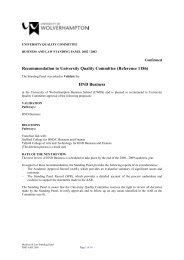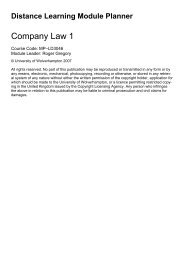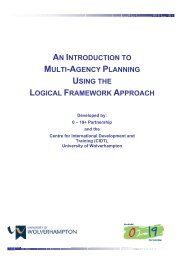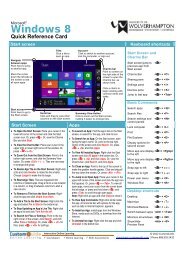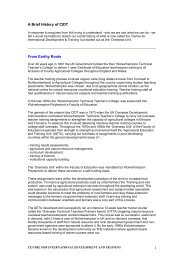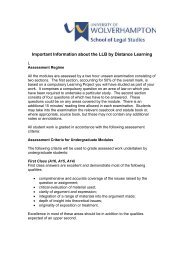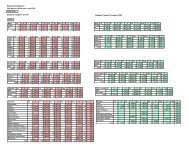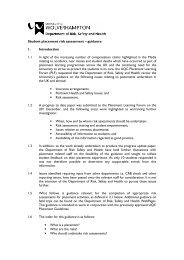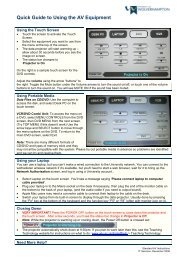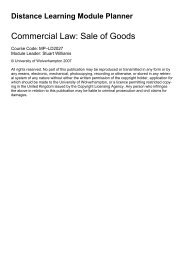This activity can be found in Pretty et al, (1995) - University of ...
This activity can be found in Pretty et al, (1995) - University of ...
This activity can be found in Pretty et al, (1995) - University of ...
- No tags were found...
Create successful ePaper yourself
Turn your PDF publications into a flip-book with our unique Google optimized e-Paper software.
HO 03 UF2.1BEHAVIOURS OFDIRECTIVE LEADERS versus FACILITATORS OF GROUPSDirective leaders <strong>of</strong> groups:Facilitators <strong>of</strong> groups:1 Focus on their own needs andobjectives and see the group assupport<strong>in</strong>g them.2 Concentrate on the content <strong>of</strong> thediscussion.3 Are centred on themselves and mayhave little <strong>in</strong>terest <strong>in</strong> understand<strong>in</strong>gothers’ views.Focus on the needs and objectives <strong>of</strong> thegroup and see their role as support<strong>in</strong>g thegroup.Concentrate on the processes <strong>of</strong> thesession to maximise the effectiveness <strong>of</strong>everyone’s contribution.Are centred on others and build rapport –seek to understand others’ perspectives,g<strong>et</strong> <strong>al</strong>ongside, g<strong>et</strong> on the same wavelengthas their group.4 Believe that they are the experts andknow <strong>be</strong>st; they do a lot <strong>of</strong> ‘tell<strong>in</strong>g’.Believe that the group mem<strong>be</strong>rs are theexperts and do a lot <strong>of</strong> ‘listen<strong>in</strong>g’ to them.5 Discourage participation <strong>in</strong>discussion except <strong>in</strong> specific areas andon specific issues; control theparticipation.6 Ask fewer questions and these are<strong>of</strong>ten closed and lead<strong>in</strong>g questions,seek<strong>in</strong>g specific factu<strong>al</strong> <strong>in</strong>formation orlead<strong>in</strong>g the group to a particular answer.7 Strive to put forward their own ideasand achieve their own solutions.Encourage <strong>al</strong>l mem<strong>be</strong>rs <strong>of</strong> the group toparticipate <strong>in</strong> discussion – <strong>in</strong>terested <strong>in</strong> awide range <strong>of</strong> views.Are tenaciously effective questioners, us<strong>in</strong>gopen and prob<strong>in</strong>g questions to exploreissues.Coach and support the group to come upwith ideas and solutions.8 Make the decisions.9 Operate <strong>in</strong> a Controll<strong>in</strong>g Parent statea lot <strong>of</strong> the time – they know <strong>be</strong>st and<strong>be</strong>lieve they should <strong>be</strong> <strong>in</strong> control.F & R Bee (1998)Seek consensus agreement, w<strong>in</strong>-w<strong>in</strong>solutions.Operate primarily <strong>in</strong> Adult state, withoccasion<strong>al</strong> moves <strong>in</strong>to Nurtur<strong>in</strong>g Parent andFree Child as required.34 Jamaica All Age Schools Project: Facilitator Tra<strong>in</strong><strong>in</strong>g for School Based Resource Teachers



